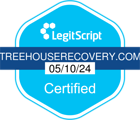Getting sober is not a token of immunity from all of life’s unpredictable circumstances. Car accidents happen. Sports injuries happen. Freak accidents in nature happens. Disease, disorder, and cancer happen to even the healthiest, most active of people. Medical emergencies of all shapes and forms can happen to us in our sobriety. When they do, we might be faced with a tough decision to make: should we take prescription drugs? In some cases, we may not have a choice, like if we go unconscious and wake up in a hospital to find a morphine drip in our arm. For other cases, taking prescription drugs is common, like for a psychological or mild medical issue. However, when it comes to a drug that could be addicting, like an opioid, a benzodiazepine, or a stimulant, we have to put our recovery first.
The mainstream model of addiction strongly suggests that someone who is recovering is incapable of taking any kind of addictive substance “normally” and if they can consume mind-altering substances, they must never have truly been addicted in the first place. Such an unrealistic narrative is damaging to someone who may have to face short term medication treatment in their sobriety. Relapse is not inevitable in recovery. Medication management is critical and can aid in necessary medical recovery while maintaining addiction recovery. Plenty of men in recovery who have had to undergo invasive surgery, have had traumatic injury, or endured some other life event necessitating the use of opioids or other serious medications, take those medications short term, and do not relapse into drug abuse. One thing needs to be made clear: taking medications as prescribed, short term, to treat a medical issue, is not a relapse. Abusing a prescription medicine or taking it beyond a necessary length of time, can count as a relapse or lead to a renewed drug problem.
Ask your doctor for alternatives
Medications do exist which are as powerful as drugs like opioids for pain treatment. Doctors are usually aware of non-narcotic or non-addictive alternatives, they’re just typically used to writing one kind of medication. Ask your doctor what your options are, how necessary the medication is, and what the shortest amount of time you can be on the medication should be. Do not allow your doctor to write refills or an extended amount of time on the medication.
Call in support from someone you trust
Men who take medication in treatment have someone manage their meds for them. Once men graduate to sober living or other lower levels of care, they become responsible for their own medication management. In the case of needing to take some kind of narcotic, it is suggested that men enlist someone to help them manage their medications. Keeping the meds in a safe place, administering them only when needed, and more, can be beneficial.
Talk out the side effects with your therapist
Being under the influence of a narcotic or other strong drug can be triggering. Many men find it uncomfortable to feel the sensations of being “high” in the slightest bit, even though they are not abusing the medication. Though a man desires to be sober, he may have to cope with frustrating thought processes, like liking the sensations, and feeling comforted in some way by being under the influence of these drugs. Keeping all of these experiences in can be dangerous. Turning to a therapist or trusted mentor is essential for these moments. If these thoughts spin out of control, they can lead to abuse and relapse.
Practice mindful meditation
The treatment of chronic pain has been under scrutiny since the opioid epidemic has developed into an undeniable problem. Many doctors are moving away from the use of medication and shifting their patients toward lifestyle changes, which includes the practice of mindful meditation. Numerous research studies have found that mindful meditation is a successful therapeutic intervention which reduces the experience of pain.
You are in control of your life. If you are feeling out of control of your addiction, it is time to ask for help. Call Tree House Recovery today. Our men’s treatment programs offer an innovative curriculum focused on fitness and conditioning of mind and body. (855) 202-2138






